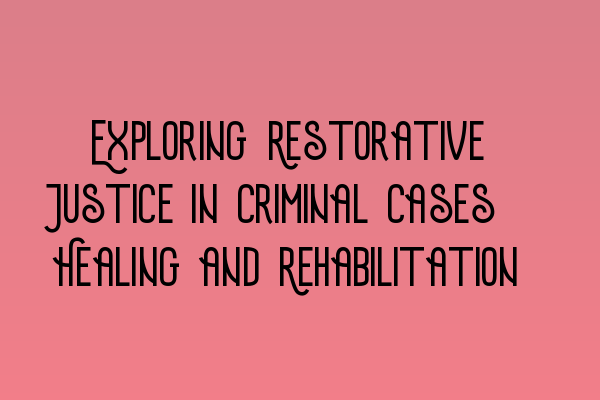Exploring Restorative Justice in Criminal Cases: Healing and Rehabilitation
Welcome to the blog of SQE Criminal Law & Practice Law UK! In today’s post, we will delve into the concept of restorative justice in criminal cases and its significance in promoting healing and rehabilitation. Criminal justice systems around the world are increasingly recognizing the value of restorative justice in addressing the needs of both victims and offenders.
Restorative justice is an alternative approach to traditional punitive methods of resolving criminal cases. It focuses on repairing the harm caused by the offense through dialogue, empathy, and understanding, rather than solely emphasizing punishment. This approach encourages active participation of both the victim and the offender, as well as the wider community.
The Principles of Restorative Justice
Restorative justice is based on several key principles:
- Inclusion: All stakeholders, including victims, offenders, and community members, are involved in the process.
- Empowerment: Participants have the opportunity to express their needs, concerns, and perspectives.
- Accountability: Offenders take responsibility for their actions and work towards making amends.
- Healing: The focus is on addressing the harm caused and facilitating the healing process.
- Reintegration: Efforts are made to reintegrate offenders back into the community as productive and law-abiding citizens.
By prioritizing these principles, restorative justice aims to provide a more holistic and transformative approach to criminal justice.
Benefits of Restorative Justice
Restorative justice offers a range of benefits for all parties involved:
- Victims: Restorative justice gives victims the opportunity to be heard, validated, and participate in the resolution process. It allows them to ask questions, express their feelings, and receive answers directly from the offender. This can promote a sense of closure and empowerment, as well as support their healing journey.
- Offenders: By actively engaging offenders in the restorative process, they are encouraged to take responsibility for their actions and understand the consequences they have caused. This can foster empathy, personal growth, and a genuine desire to make amends.
- Communities: Restorative justice involves the wider community in addressing and preventing crime. By collectively responding to offenses, communities can work towards strengthening social bonds, repairing harm, and promoting a sense of safety.
Implementing Restorative Justice
Implementing restorative justice requires a comprehensive framework that ensures effective and fair processes. Professional training and ongoing support are crucial for individuals involved in facilitating restorative justice, including lawyers, mediators, and other professionals in the criminal justice system.
At SQE Criminal Law & Practice Law UK, we acknowledge the importance of restorative justice in promoting healing and rehabilitation. Our SQE 2 Preparation Courses provide comprehensive training in criminal law, including alternative dispute resolution methods like restorative justice. We firmly believe in preparing future legal professionals to contribute positively to the evolving field of criminal justice.
In conclusion, restorative justice offers a transformative approach to criminal cases by prioritizing healing and rehabilitation. By including victims, offenders, and communities in the process, it allows for a more inclusive and empowering resolution. If you are interested in further exploring the SQE exams and preparation, check out our related articles:
- SQE 1 Practice Exam Questions
- SQE 1 Practice Mocks FLK1 FLK2
- SQE 2 Preparation Courses
- SQE 1 Preparation Courses
- SRA SQE Exam Dates
Thank you for reading this blog post on restorative justice. We hope it has provided valuable insights into this impactful approach to criminal justice. Stay tuned for more informative articles from SQE Criminal Law & Practice Law UK!
